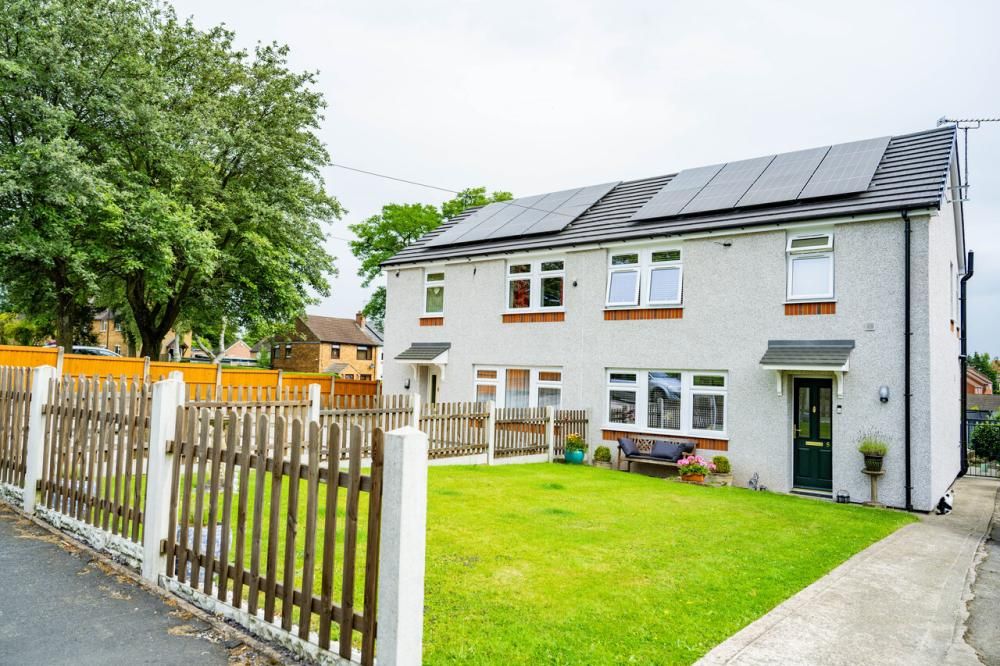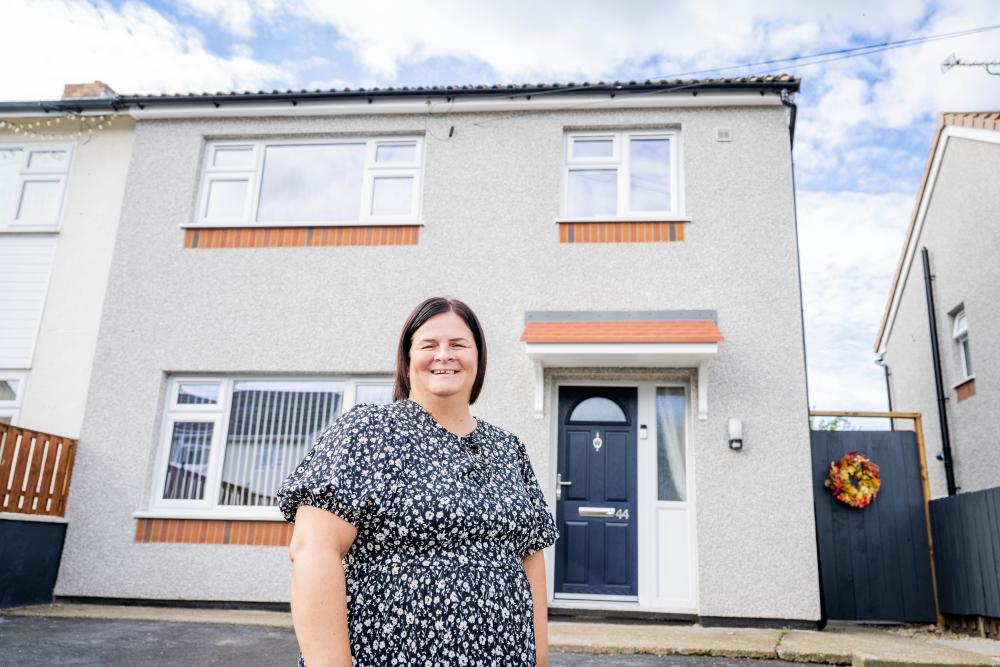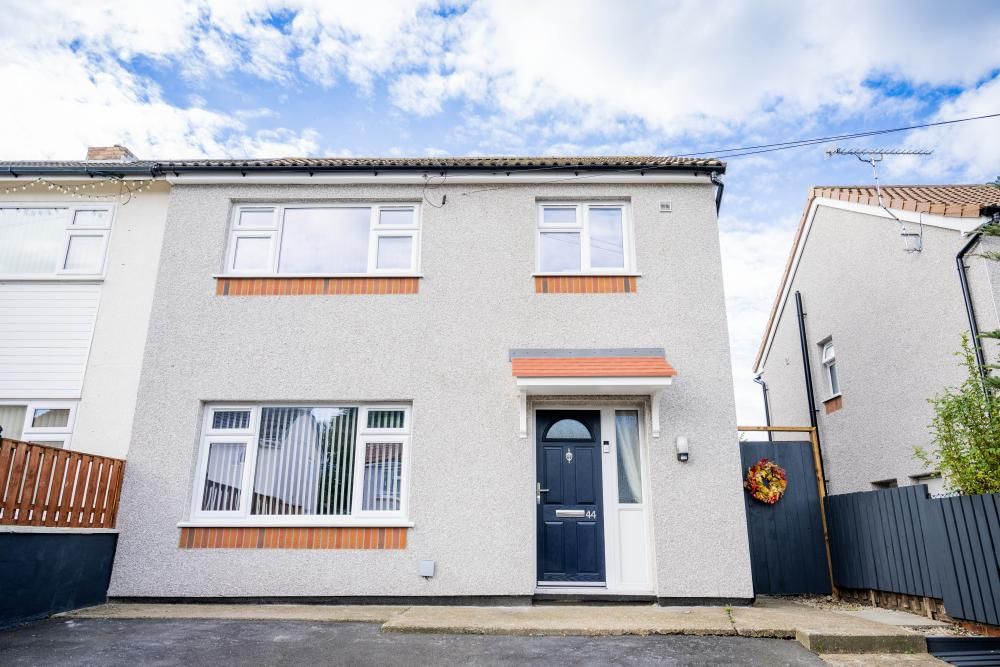Hundreds of families in the East Midlands are now living in warmer homes
North East Derbyshire Council reaches milestone with insulation upgrades completed in 500 social homes in the district
An ambitious project to upgrade insulation in hundreds of homes in North East Derbyshire is celebrating a milestone achievement with measures in 500 homes now complete.
Upgrades were made possible thanks to the government's Social Housing Decarbonisation Fund. The homes will now provide warmer and more comfortable living environments for people and families ahead of the cooler winter months.
Supporting a population of more than 100,000 residents, North East Derbyshire Council works in partnership with housing provider Rykneld to provide around 7,600 social homes for families and individuals in the area. A 500-home milestone therefore represents upgrades to approximately 6.6% of the total social homes in the district.
Rykneld Homes customer, Alison Rees, lives with her family in the 500th home to have works completed. She said: "The work has made a huge difference to how the house looks and feels.
"The house is warmer, we're using less energy and the fact that so many customers have benefitted is brilliant."
The work has made a huge difference to how the house looks and feels.
The house is warmer, we're using less energy and the fact that so many customers have benefitted is brilliant.
The 500-home milestone, which was reached earlier this year, comes at council credit to passionate and experienced teams and reliable contractors enabling a smooth retrofit of non-traditional housing stock.
Non-traditional housing stock incorporates any type of building that is not built with brick or stone walls and with tile or slate roofs. The homes, which are considered ‘hard to treat’ properties, were constructed with steel frames and are a largely located in an ex-mining community in Alferton.
Niall Clark, director of customer and strategic partnerships and deputy managing director at Rykneld Homes, said: “This project is a key part of our ongoing commitment to improving our customers' homes.
"It has delivered significant carbon reductions, improved the EPC ratings and thermal comfort of homes and reduced the risk of fuel poverty in the district.
"The programme also supports the ongoing long-term project to regenerate the council’s non-traditional housing which forms approximately 40% of the stock and wouldn't be possible without the collaborative approach of our teams and the cooperation of our communities."
It has delivered significant carbon reductions, improved the EPC ratings and thermal comfort of homes and reduced the risk of fuel poverty in the district.
Upgrades largely encompassed external wall insulation which is known to be difficult due to a variety of factors and can be perceived contentiously by residents.
To support the retrofit programme that drives the upgrades, the council was awarded £8.2 million through Wave 2.1 of the government’s Social Housing Decarbonisation Fund. We act as the delivery agent for this scheme, working closely with our delivery partner consortium via Turner and Townsend, PWC and ARUP. Funding is delivered through the delivery partner on behalf of the Department for Energy Security and Net Zero.
With an additional £13 million committed through council funds, the investment aims to implement measures at more than 600 homes through to the end of the 2024/25 financial year. Once complete, the council anticipates that the upgrades will not only ensure residents can more aptly control their energy bills but will also reduce the carbon footprint of these homes by 966 tonnes a year. A 966-tonne reduction in annual carbon emissions is equivalent to driving 8.9 million miles in an average petrol car – a distance large enough to get you from London to Cape Town, South Africa, 1,077 times*.
Paul Hill, our interim head of housing, said: “This milestone achievement by Rykneld Homes and North East Derbyshire Council is a true showcase of an evolving journey and continued focus that puts residents at the heart of everything they do.
“While there is still some way to go, these initial steps demonstrate the commitment the council is making to reducing emissions, bringing down residents’ energy bills and ensuring families are warmer and more comfortable in their homes all year round.”
While there is still some way to go, these initial steps demonstrate the commitment the council is making to reducing emissions, bringing down residents’ energy bills and ensuring families are warmer and more comfortable in their homes all year round.



About the Social Housing Decarbonisation Fund
First launched in August 2021, the Social Housing Decarbonisation Fund made grant funding available to eligible social housing landlords, including local authorities and housing associations, so that they can install energy efficiency measures, such as insulation and heat pumps, in socially rented homes.
The scheme is designed to support more social housing tenants, who will benefit from homes that are warmer and cheaper to heat, saving money on their fuel bills, as well as cutting carbon emissions, as part of the UK’s approach to delivering net zero in a way that reduces the burden on British families.
In our capacity as delivery agent for the scheme, we provide assurance to the Department for Energy Security and Net Zero. We continue to monitor and make refinements, responding to the feedback we receive, to ultimately help all successful grant recipients on their journey to supporting the net zero agenda.
Read more about the scheme through our website.
*Carbon calculations have been generated through a tool created by our carbon and technical experts here at Salix. The intention is to provide carbon savings estimates to aid with a common understanding of emission data and statistics. These estimates are approximate; it is not recommended to use this tool for formal carbon emissions analysis. The tool uses UK government conversion factors alongside emissions estimates sourced from various studies, but it is possible a margin of error may exist. For more information about the formulas and methodology used in this tool, please contact us at [email protected]. E&OE.


